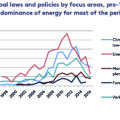Producer Cities and Consumer Cities: Using Production- and Consumption-Based Carbon Accounts to Guide Climate Action in China, the UK, and the US
Research article by Andrew Sudmant, Joel Millward-Hopkins, Andy Gouldson, John Barrett, Kate Scott on 1 Mar 2018
Meeting the commitments made in the Paris Agreement on climate change will require different approaches in different countries. However, a common feature in many contexts relates to the continued and sometimes increasing significance of the carbon footprints of urban centres. These footprints consider both production or territorial (i.e. Scope 1 and 2) emissions, and consumption […]






